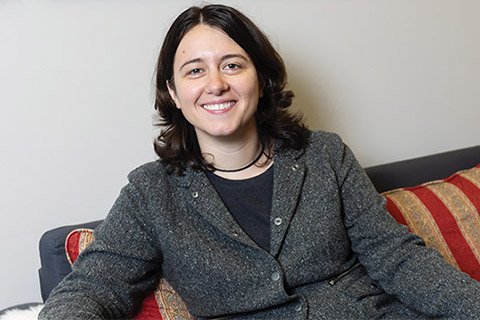Networking for Humans

CSE assistant professor designs technologies that advance relationships to treat social isolation
December 6, 2019
The digital revolution has entered a period of reckoning. Recently, almost every discussion of the ills afflicting American society laments the downside of our technological dependency and the social fragmentation it has wrought.
Lana Yarosh wants to design remedies—technologies that enhance relationships.
Yarosh is an assistant professor in the Department of Computer Science and Engineering and a McKnight Land-Grant Professor. Her research focuses on “embodied interaction” in social computing with an explicit goal of building systems that forge stronger bonds among people.
“I think it’s our responsibility,” she said.
“Social isolation is higher than it has ever been. We’re learning so much more about how it effects people. It is a bigger predictor of mortality than obesity and smoking," Yarosh said.
Technologists can no longer turn innovations loose into the world and ignore the destructive effects—the erosion of privacy, the spread of false information and propaganda, threats to democracy, economic disruption, and more.
In 2018, Yarosh joined a dozen technologists who issued a declaration bemoaning the “serious and embarrassing intellectual lapse” of the computing community for failing to consider the downsides of their innovations. She and her colleagues called for changes in the peer review process to consider negative consequences, just as the medical industry does.
In recent years, Yarosh shifted her research toward the potential role of technology in addressing addiction. Personal experience played a role: Yarosh is in recovery herself.
“It’s been such a powerful experience,” she said of her work.
“When I saw the possibilities for the interface between my research passions, skills, and basically something that saved my life,” she said, “I felt like I found my calling.”
Her research has won three grants from the U.S. National Science Foundation—nearly $900,000 in total.
Bringing people together
One project examined how to preserve anonymity while bolstering online support networks among recovering addicts and alcoholics. Another examined whether the reassurance of “supportive touch” (such as holding hands at the start of an Alcoholics Anonymous meeting) can be duplicated with remote technology.
A third investigated how social computing might enhance feelings of connectedness and peer support among those recovering from substance abuse (as well as isolated elderly people and children).
Yarosh has designed technology solutions to bring people together.
One mobile application forges connections between people who have recently entered recovery and their sponsors, while another “recovery Fitbit” tracks healthy activities and provides feedback to reduce the risk of relapse.
“All my roads lead back to social connectedness,” Yarosh said.
“Even when I start with projects that conceivably have nothing to do with that space,” she explained, “somehow the follow-up work always leads back to it.”
Written by Kermit Pattison
Read about CSE professor Ellad Tadmor's approach to public policy in "Defending Science."
Read about CSE teaching professor Paul Imbertson's path to cleaner energy in "A Powerful Journey."
